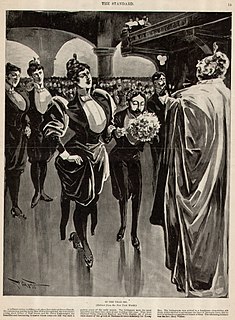Related Research Articles

A slippery slope argument (SSA), in logic, critical thinking, political rhetoric, and caselaw, is an argument in which a party asserts that a relatively small first step leads to a chain of related events culminating in some significant effect. The core of the slippery slope argument is that a specific decision under debate is likely to result in unintended consequences. The strength of such an argument depends on whether the small step really is likely to lead to the effect. This is quantified in terms of what is known as the warrant. This type of argument is sometimes used as a form of fearmongering in which the probable consequences of a given action are exaggerated in an attempt to scare the audience. However, differentiation is necessary, since, in other cases, it might be demonstrable that the small step is likely to lead to an effect.
A fallacy is the use of invalid or otherwise faulty reasoning, or "wrong moves," in the construction of an argument, which may appear stronger than it really is if the fallacy is not spotted. The term was in the Western intellectual tradition introduced in the Aristotelian De Sophisticis Elenchis.

The judiciary is the system of courts that adjudicates legal disputes/disagreements and interprets, defends, and applies the law in legal cases.

Analogy is a cognitive process of transferring information or meaning from a particular subject to another, or a linguistic expression corresponding to such a process. In a narrower sense, analogy is an inference or an argument from one particular to another particular, as opposed to deduction, induction, and abduction, in which at least one of the premises, or the conclusion, is general rather than particular in nature. The term analogy can also refer to the relation between the source and the target themselves, which is often a similarity, as in the biological notion of analogy.
Inductive reasoning is a method of reasoning in which a body of observations is considered to derive a general principle. It consists of making broad generalizations based on specific observations. Inductive reasoning is distinct from deductive reasoning. If the premises are correct, the conclusion of a deductive argument is certain; in contrast, the truth of the conclusion of an inductive argument is probable, based upon the evidence given.
In classical logic, intuitionistic logic and similar logical systems, the principle of explosion, or the principle of Pseudo-Scotus, is the law according to which any statement can be proven from a contradiction. That is, once a contradiction has been asserted, any proposition can be inferred from it; this is known as deductive explosion.
Sui iuris also spelled sui juris, is a Latin phrase that literally means "of one's own right". It is used in both secular law and the Catholic Church's canon law. The term church sui iuris is used in the Catholic Code of Canons of the Eastern Churches (CCEO) to denote the autonomous churches in Catholic communion. The Catholic Church consists of 24 churches, including the Latin Church and 23 Eastern Catholic churches.
In Islamic jurisprudence, qiyas is the process of deductive analogy in which the teachings of the hadith are compared and contrasted with those of the Quran, in order to apply a known injunction (nass) to a new circumstance and create a new injunction. Here the ruling of the Sunnah and the Quran may be used as a means to solve or provide a response to a new problem that may arise. This, however, is only the case providing that the set precedent or paradigm and the new problem that has come about will share operative causes. The ʿillah is the specific set of circumstances that trigger a certain law into action. An example of the use of qiyās is the case of the ban on selling or buying of goods after the last call for Friday prayers until the end of the prayer stated in the Quran 62:9. By analogy this prohibition is extended to other transactions and activities such as agricultural work and administration. Among Sunni Muslims, Qiyas has been accepted as a secondary source of Sharia law along with Ijmāʿ, after the primary sources of the Quran, and the Sunnah.
In common law and civil law, a rebuttable presumption is an assumption made by a court that is taken to be true unless someone proves otherwise. For example, a defendant in a criminal case is presumed innocent until proven guilty. It is often associated with prima facie evidence.

Azo of Bologna or Azzo or Azolenus was an influential Italian jurist and a member of the school of the so-called glossators. Born circa 1150 in Bologna, Azo studied under Joannes Bassianus and became professor of civil law at Bologna. He is sometimes known as Azo Soldanus, from his father's surname, and also Azzo Porcius, to distinguish him from later famous Italians named Azzo. He died circa 1230.

Erich Przywara was a Jesuit priest, philosopher, and theologian of German-Polish origin, who was one of the first Catholics to engage in dialogue with modern philosophers, especially those of the phenomenological tradition. He is best known for synthesizing the thought of prominent thinkers around the notion of the analogy of being, the tension between divine immanence and divine transcendence, a "unity-in-tension".
The rule of faith is the name given to the ultimate authority or standard in religious belief. It was used by Early Christian writers such as Tertullian. The phrase is sometimes used for early creeds.
In computer science, in particular in knowledge representation and reasoning and metalogic, the area of automated reasoning is dedicated to understanding different aspects of reasoning. The study of automated reasoning helps produce computer programs that allow computers to reason completely, or nearly completely, automatically. Although automated reasoning is considered a sub-field of artificial intelligence, it also has connections with theoretical computer science and philosophy.
Victor Grippo was an Argentine painter, engraver and sculptor, considered the father of conceptual art in Argentina. He was born in Junín, province of Buenos Aires, the elder of two sons of an Italian immigrant father and an Argentine mother of Albanese origin.
Regulæ Juris, also spelled Regulae iuris were legal maxims which served as jurisprudence in Roman law.
Evidence of absence is evidence of any kind that suggests something is missing or that it does not exist. What counts as evidence of absence has been a subject of debate between scientists and philosophers. It is often distinguished from absence of evidence.
In law, inorantia juris non excusat, or ignorantia legis neminem excusat, is a legal principle holding that a person who is unaware of a law may not escape liability for violating that law merely by being unaware of its content.

Gary William Chartier Gary Chartier is a legal scholar, philosopher, political theorist, and theologian. His work addresses anarchism and ethics. Chartier is a professor and serves as associate dean of La Sierra University's business school.
Argument from analogy is a special type of inductive argument, whereby perceived similarities are used as a basis to infer some further similarity that has yet to be observed. Analogical reasoning is one of the most common methods by which human beings attempt to understand the world and make decisions. When a person has a bad experience with a product and decides not to buy anything further from the producer, this is often a case of analogical reasoning. It is also implicit in much of science; for instance, experiments on laboratory rats typically proceed on the basis that some physiological similarities between rats and humans entails some further similarity.
Analogia iuris is the concept that legal consequences can derive from the spirit of the law as is often the case in continental European law. It can be contrasted with analogia legis, whereby legal consequences arise from the wording of statutes.
References
- ↑ Damele, Giovanni (2014). "Analogia Legis and Analogia Iuris: An Overview from a Rhetorical Perspective". In Ribeiro, Henrique Jales (ed.). Systematic Approaches to Argument by Analogy. Argumentation Library. Vol. 25. Cham: Springer International Publishing. pp. 243–256. doi:10.1007/978-3-319-06334-8_14. ISBN 978-3-319-06334-8.